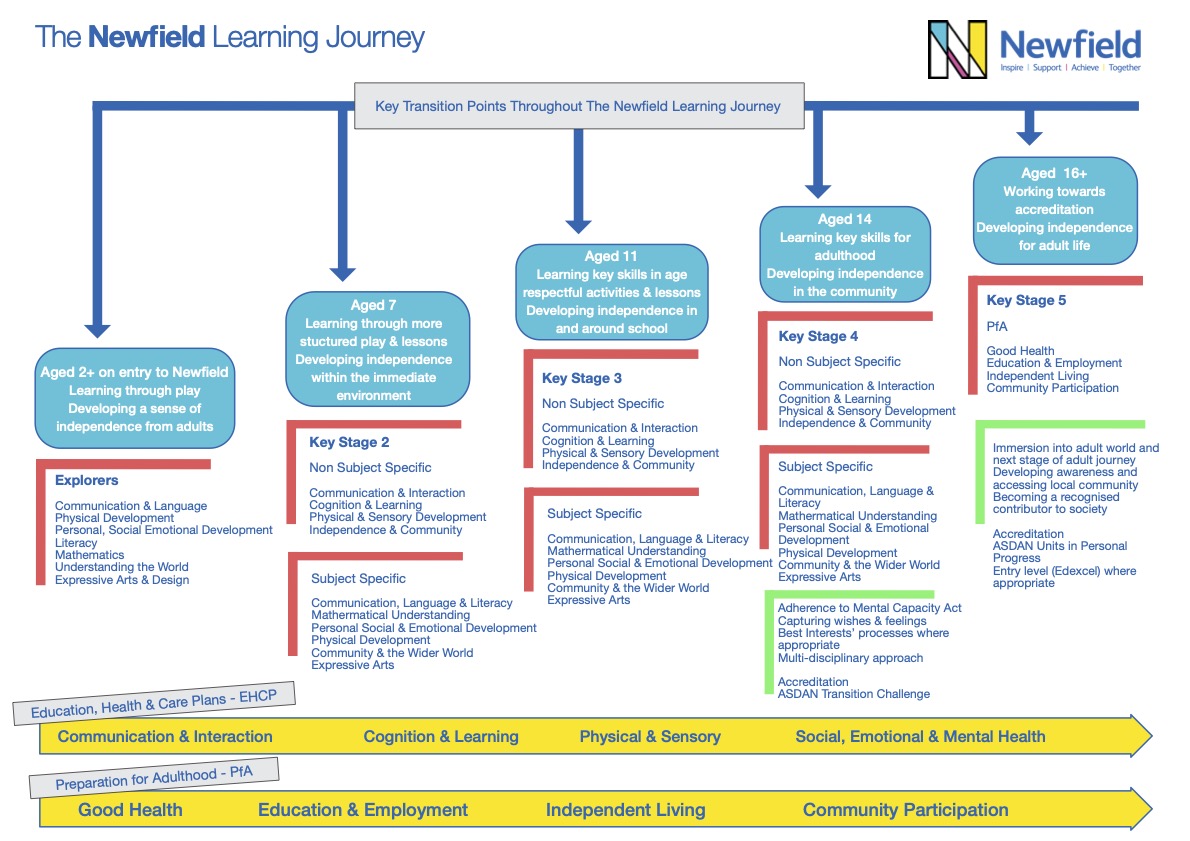Curriculum Overview
We provide an holistic curriculum which embraces individual needs to ensure that each learner will meet their full potential academically, physically, socially and emotionally.
Our Philosophy
An Individual needs led Curriculum approach to learning and progress
For the children and staff at Newfield the curriculum covers every minute of their time with us in school. It is of course also extended through our work with them, to every minute of their time at home.
In its truest sense we operate a team around the child and family approach.
The children and young adults at Newfield School have a vast range of physical, sensory, learning, emotional, social and medical needs. Their cognitive abilities and capacity cover a huge range, from those who may be learning consistent eye gaze, in a very sensory context, to those who are learning to tell stories, tell the time and manage their own money, through more functional, skills based learning.
All children and young people with learning difficulties can have unique ways of learning. We see our pupil’s strengths first, and work with these to develop other areas.
Different learning needs require different teaching approaches, which often change over time. As a school we actively research new methods to impact on learning and progress for all our pupils absorbing these into current practice in order to enhance provision.
At all times we strive to ensure that teaching fits to the needs of the current groups of students, and is therefore responsive and adaptable. In simple terms we focus on teaching the way students learn best.
There is no one curriculum model which could possibly fit all our pupils. Each needs a unique curriculum which extends beyond the school day into their lives beyond.
We achieve this by investing in staff training at all levels to equip the team with the knowledge, skills and resources needed to work with such complex students. We provide them with the box of tools and they select the best ones for each student!
We pride ourselves on providing a set of learning experiences across a child’s time with us which places the needs and the abilities of the learners at the heart of provision and planning. It is based on outcomes we want the pupils to achieve at each key stage of their learning journey. For every pupil regardless of age or ability we seek to support them to become as independent as possible in all aspects of life and learning.
Above all, we believe everything we do, and everything each learner experiences, must be useful and relevant for their life outside school in their home and wider community.
To achieve this we have developed our very own integrated approach.
This is based around a thorough, integrated and ongoing assessment of need in the areas we consider fundamental to developing the whole child. We can then find the best teaching methods, interventions and environment for each learner.
This journey is planned in consultation with the people best placed to make decisions supported by the knowledge of expert professionals.
We firmly believe this allows our children to make the progress they are capable of – an approach which focuses therefore on what they can and will do, rather than what they can’t. To us there is no such phrase as ‘I can’t’ we just say ‘You can’t yet’
We acknowledge the need for a cognitively appropriate, ‘broad and balanced curriculum’ and have developed a set of learning experiences that encompass all required areas of learning across the ages in school.
We are therefore flexible in using ideas and methodologies and advices from various sources including the early year’s curriculum, national curriculum, and study programmes. From these we empower our expert staff to take what we feel is relevant and appropriate to the developmental needs of each pupil.
As such there is no rigid timetabling or predetermined balance of focus. Each piece of planned learning and progress forms part of a functional and meaningful path for that child taking whatever direction the learner needs. This means we have no pre-conceptions of any learner’s path of progress and do not limit our expectations, to allow the learner to lead us in their journey.
Seeing is believing and we invite you all to come and see how it works and how the amazing students we have reward us every day with their successes.
Learners embark on learning pathways during which are designed to be tailored to their individual needs. Via an on-going cycle of assessment and planning learners access lessons that are motivating and challenging and build the skills and knowledge they need to equip them for successful futures in their adult life.
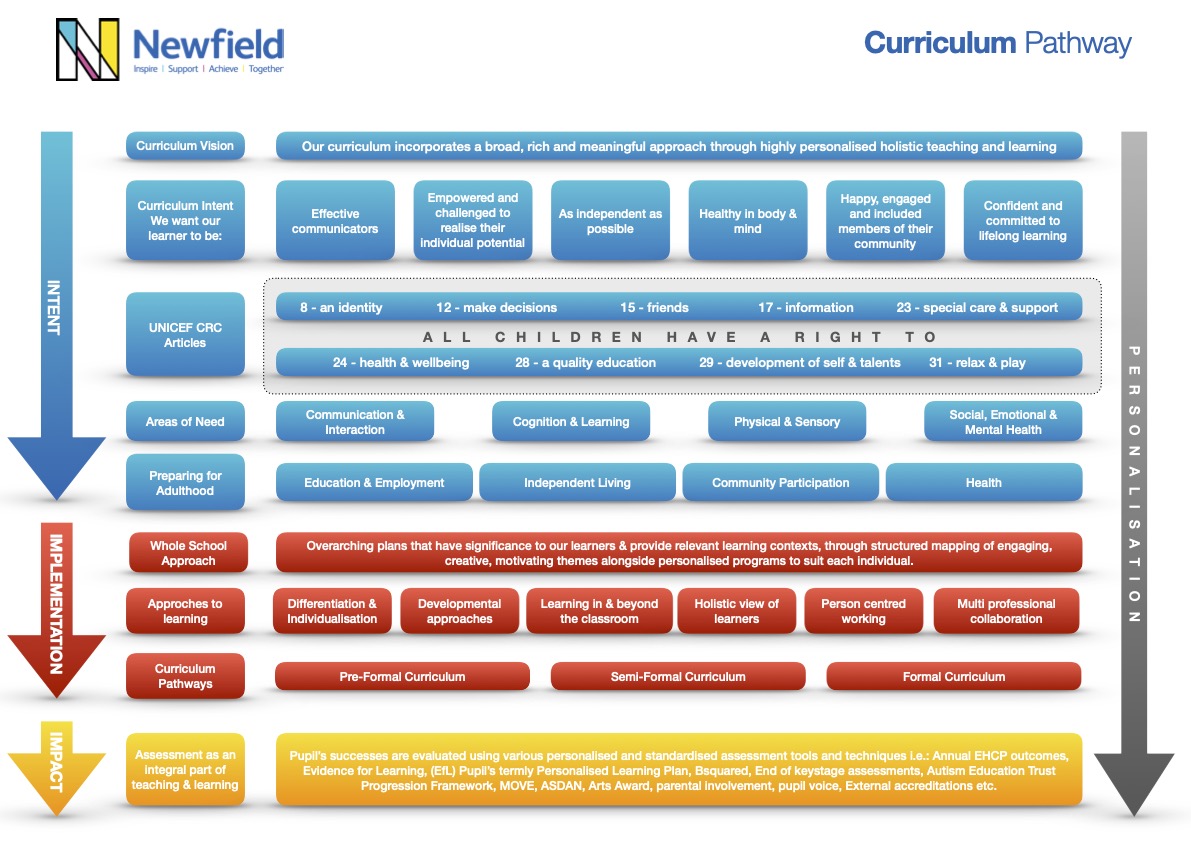
More details of our Curriculum Philosophy can be found here.
Curriculum Intent & Implementation
At Newfield we recognise the importance of a curriculum that promotes education, development and care whilst providing exciting and motivating learning opportunities for all our learners.
As such, our curriculum incorporates a broad, rich and meaningful approach with highly personalised holistic teaching and learning.
Curriculum Intent
We want our learners at Newfield School to be:
- Effective communicators
- Empowered & challenged to realise their individual potential
- As independent as possible
- Healthy in body & mind
- Happy, engaged & included members of their community
- Confident & committed to lifelong learning
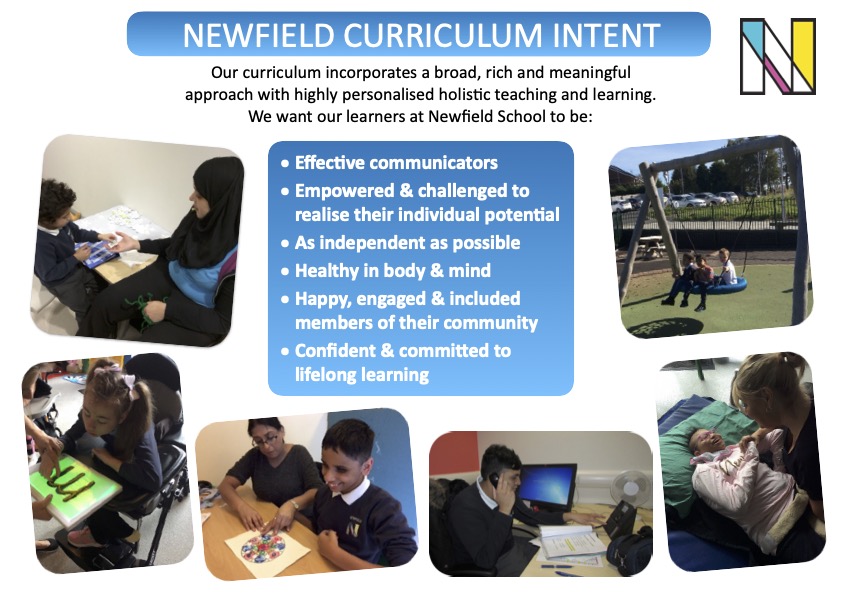
Curriculum Implementation
All learners at Newfield School require a flexible curriculum that takes into account their specific skills and needs, including therapy needs. The school ensures that there are effective learning opportunities for the inclusion of all learners across all age phases and areas of school. Our curriculum pathways have been developed to prioritise the individual needs of our learners and to ensure that those needs identified in their Education, Health and Care Plan are central to each learner’s personalised curriculum.
Our curriculum pathways allow us to create personalised journeys to meet the needs for each individual. Our developmental skills based and creative curricular aim to encourage all of our learners to participate in opportunities that enhance their learning and independence – on whichever pathway is best for them.
Through a multi disciplinary and integrated approach learners learning styles and needs are identified. Each learner is unique and therefore can take an individualised learning pathway. Teaching and learning opportunities for our learners span the whole day, including lunch and break times, time spent on personal care and therapy routines, and indeed time at home or in short break services.
The amount of time allocated to the various subject areas will vary over time and across the different pathways.
In planning for breadth and balance across the different pathways in school we take account of:
- the statutory requirements
- the changing needs of learners
- the views of parents
- the views of a range of professionals
- the levels of support required
-
The school provides a range of activities differentiated according to the age and needs of the pupils. All classes have a daily act of Collective Worship.
More information can be found in our Teaching and Learning Policy
The Pathways followed by each learner are carefully structured around the needs and abilities of each individual.
More information can be found about each pathway in the links below:
The content of each pathway is based around the 4 areas of need: Cognition and Learning, Communication and Interaction, Physical and Sensory, Social, Emotional and Mental Health.
Each pathway builds upon the next and allows learners to embed and deepen their knowledge and understanding and they progress through school.
The chart below shows how the Areas of Learning mesh together through the progress between pathways and age phases, with the content of each pathway reflecting different areas of learning.
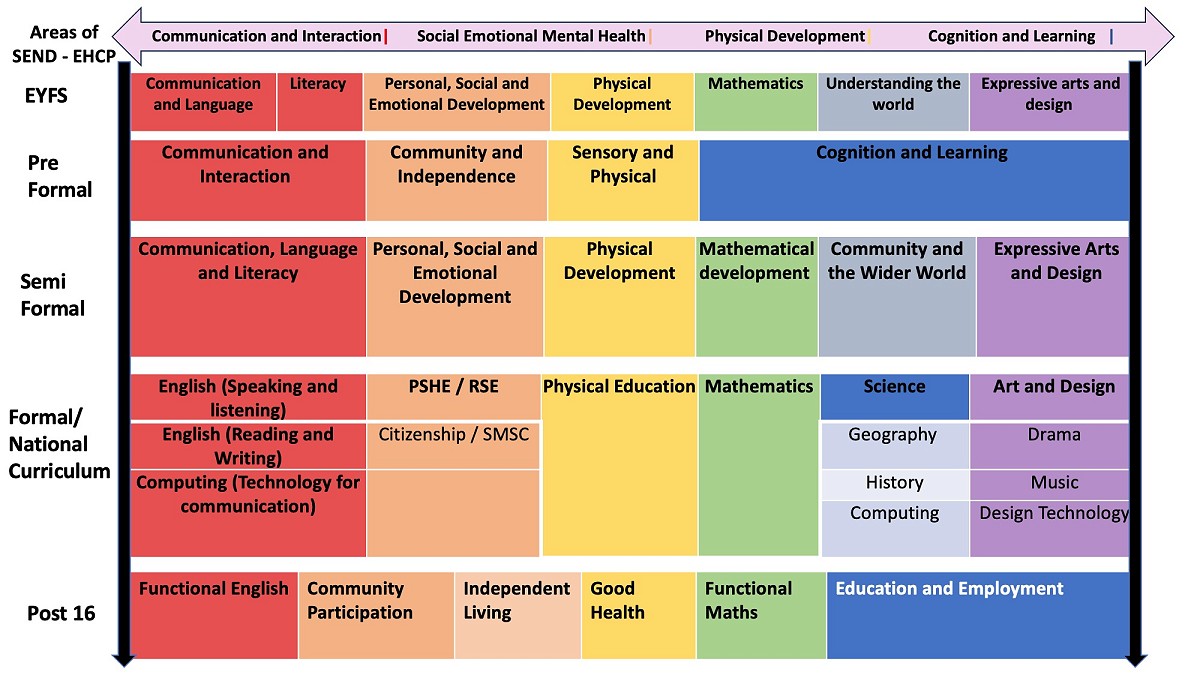
The derivation of the knowledge and skills content of our curriculum is carefully drawn from National Curriculum, EYFS framework, Newfield Skills Framework with support from other recognised schemes such as EQUALS, White Rose Maths and Twinkl Phonics.
Religious Education is delivered discretely in weekly sessions - see RE long term coverage
Due to the needs of our learners Modern Foreign Languages is not included in the weekly taught curriculum. Learners who attend Newfield School all have complex needs and learning disabilities which mean that the fundamentals of communication are the priority for teaching. Cultural value and diversity is celebrated through an annual Languages Day.
Teaching Reading and Phonics
‘Through reading in particular, pupils have a chance to develop culturally, emotionally, intellectually, socially and spiritually. Literature, especially, plays a key role in such development. Reading also enables pupils both to acquire knowledge and to build on what they already know’.
The National Curriculum in England, 2013.
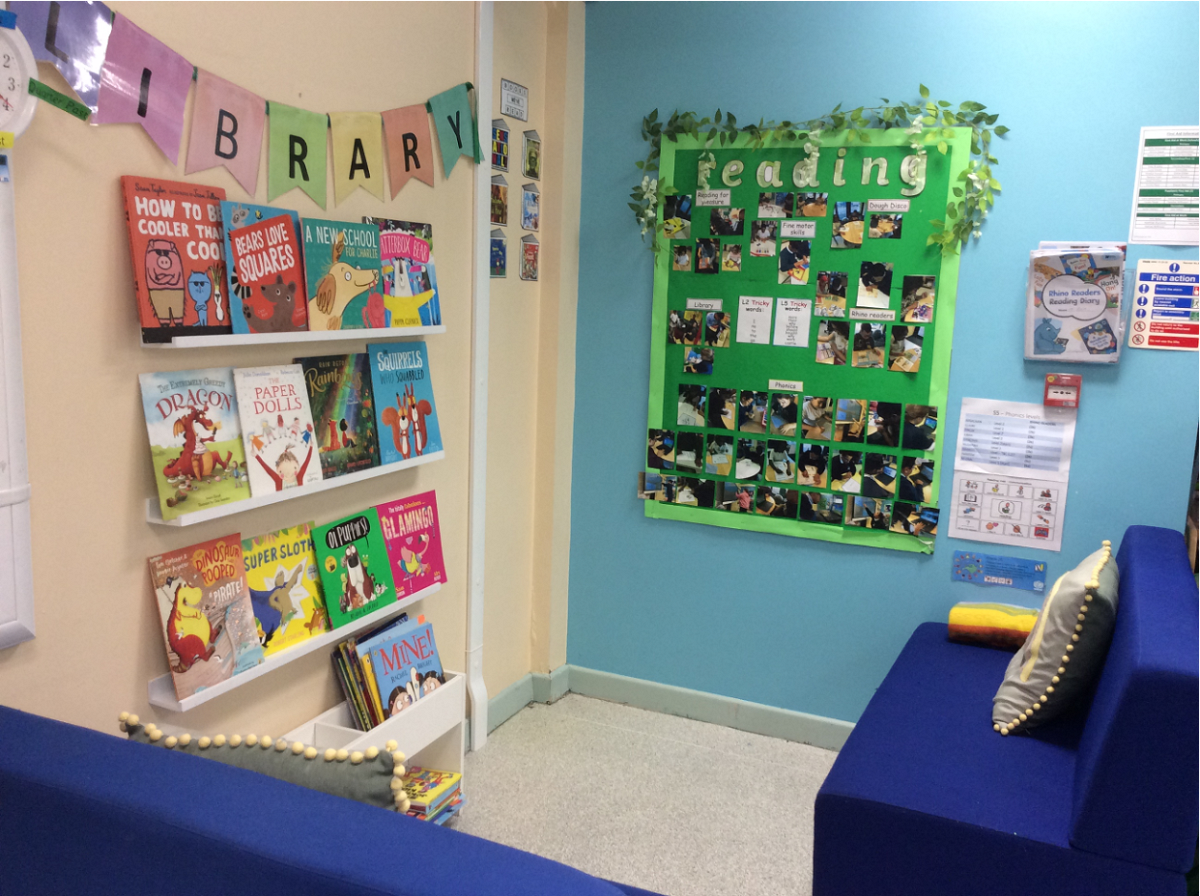
Intent
At Newfield school, reading is a priority and a key driver for the curriculum themes within our school. It is our intent that all pupils develop the skills needed to be effective readers, along with an enjoyment of literature, enabling children to become lifelong readers, in line with their individual needs. We aim for pupils to experience a range of texts, themes, genres and vocabulary to support language and communication skills at their own level, giving them the confidence to communicate effectively both now and in the future.
We encourage all pupils to read widely, and be exposed to texts beyond their own reading level including fiction, non-fiction and poetry. We are committed to providing high quality, vocabulary rich and engaging reading material, ensuring these are age appropriate and varied as pupils progress through their time with us and journey from primary and into secondary.
Implementation
Phonics
At Newfield we use the DfE approved Twinkl Phonics programme to plan and deliver daily phonics lessons, ensuring a cohesive, whole school approach to phonics. This is delivered to pupils from explorers (EYFS and Key Stage 1) through to Key Stage 3. The Twinkl Phonics Programme offers a coherently planned sequence of lessons that supports the effective teaching of phonics across school.
- Level 1 Twinkl Phonics provides themed teaching packs to deliver each of the DfE’s Phase 1 phonics aspects. Throughout Level 1, learners develop the knowledge, skills and understanding to discriminate between and use auditory, environmental and instrumental sounds. Level 1 is taught first and then embedded throughout the teaching of phonics Levels 2-6.
- In Levels 2-4 learners are introduced to phonemes/sounds and graphemes/letters systematically. They also learn to develop and apply blending and segmenting skills for reading and writing.
- Learners ready to progress will access Levels 5 and 6. The coherently planned sequence of lessons within Level 5 allows opportunities for children to apply their phonics knowledge and skills as the prime approach to reading and spelling. It focuses on phonetically decodable two-syllable and three-syllable words and the alternative ways of pronouncing and representing the long vowel phonemes. Furthermore, children will develop their ability to attempt to read and spell increasingly complex words. By Level 6, children explore spelling patterns and grammar while also developing a breadth of knowledge, skills and understanding in the recognition and spelling of common exception words.
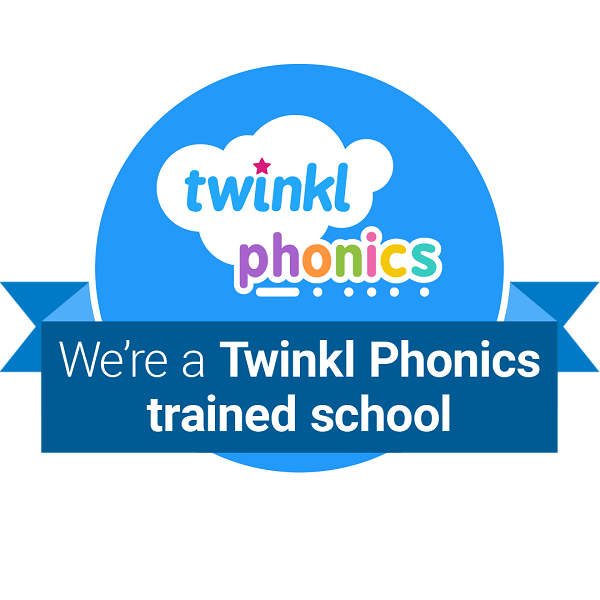
The Twinkl Phonics Progression Map (see appendix to the English policy) sets clear expectations for pupil’s progress within the Twinkl Phonics Programme. Due to the nature of learners at Newfield School, age related expectations have not been set, allowing pupils to develop their phonics knowledge in line with their individual needs and at their own pace.
Pre-formal and pathfinder learners
We have high expectations for all of our learners and aspire to support all children on their reading journey, at whatever level they are at. Children who are on a pre-formal pathway use Routes for Learning as a framework to develop the attention and listening skills which are a pre-requisite to level 1 Phonics learning. Care has been taken to ensure an overlap in skills for pupils who are ready to move from Routes for Learning and are ready to develop their skills further through level 1 Twinkl phonics. This is evidenced in the ‘pathfinder’ entry band for the reading and writing skills frameworks.
Reading after phonics
The school’s reading and writing frameworks are written to ensure a scaffolded building of skills and knowledge throughout a learner’s time at Newfield. If pupils become ready to move ‘beyond phonics’ they will continue to follow the frameworks to support ongoing skill development as pupils continue to apply, develop and generalise reading and writing skills gained throughout their earlier phonics learning.
Newfield Reading Spine
Pupils learn through a broad and balanced range of texts throughout their time at Newfield, reflecting the age related themes and coverage that is outlined in the National Curriculum, but using accessible and appropriate texts and stories to gain this exposure.
This includes texts which are above the level they are able to read themselves. The reading spine gives an overview of some of the core texts pupils will access on the semi-formal pathway, but is by no means exclusive and gives a sample of the themes and genres explored through English lessons across the key stages.
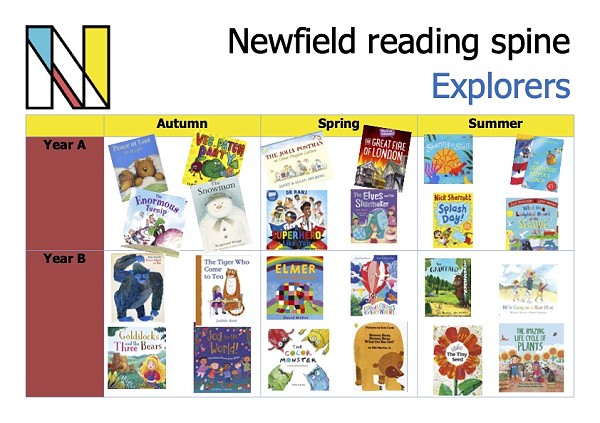

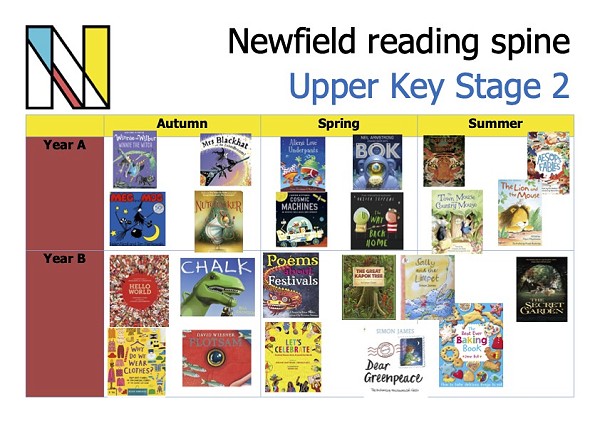

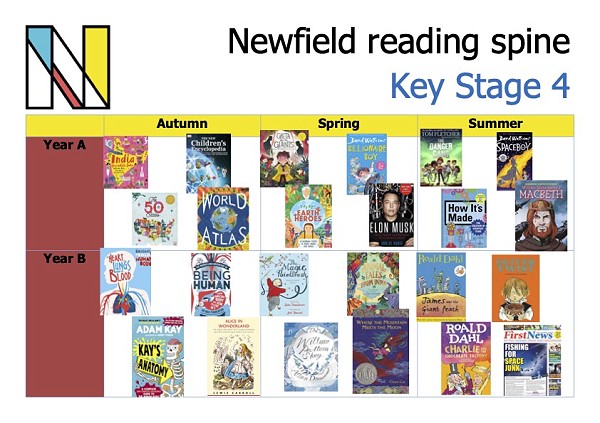
Impact
Our aim is for our learners to develop skills in reading and writing in line with their own needs, supporting them to develop a love of reading and will the skills to prepare them for their later life after their time at Newfield.
The impact of reading and writing is measured through:
- Twinkl Phonics tracking documents are completed by teachers, allowing headteachers, senior leaders, teachers and practitioners to track pupil’s progress. It provides opportunities for data analysis and encourages discussions around pupil progress, group progress, future learning and misconceptions, enabling schools to respond and adapt teaching within the programme to provide additional support and challenge to pupils.
- Pupils who are ready and able to access the year 1 phonics screening check will be supported to access this
- We track reading and writing attainment in line with our internal assessment and systems including on Evidence for Learning and bSquared
- Older learners who are able to access other assessments such as function skills exams will be supported to do so
In addition to this:
Parents and carers can access information about reading and phonics here or by speaking to their child’s class teacher. Please click the links for further support for parents wishing to help children to blend, or with segmenting and spelling.
We hold parent events to come and learn more about phonics, reading and communication and encourage parents who are interested to speak to their child’s class teacher to get more information.
Pupils are sent home with a reading book and diary which parents are encouraged to share at home, ideas on how to support reading at home can be found here, or alternatively speak to your child’s class teacher.
Information on sharing texts with deaf children or visually impaired children is also available.
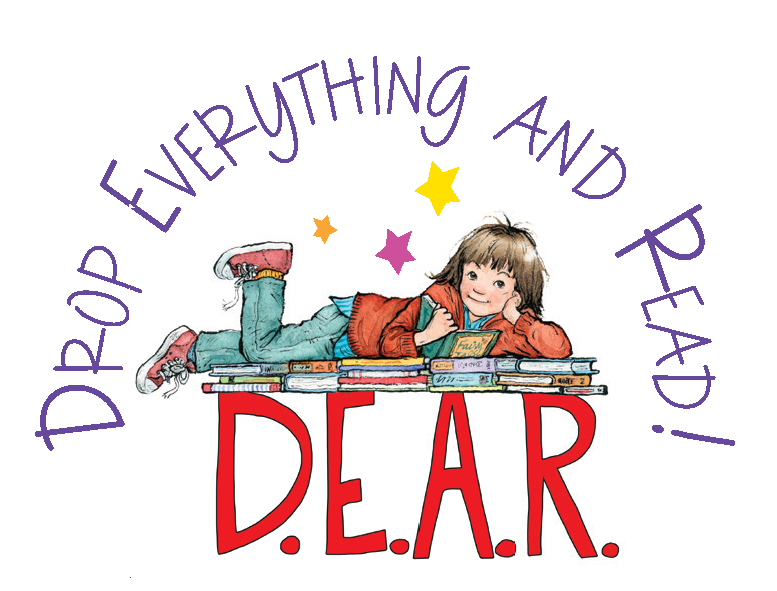
Specialist Reading Strategies
Many of our learners have communication needs including Autism which can present barriers to learning when accessing phonics lessons. As such, alongside a synthetic systematic phonics programme, pupils are supported to develop reading through regular shared reading, non-verbal interactive reading opportunities, discussing stories using assisted communication, reading and writing with communication aids, and practicing literacy across the curriculum to embed skills. Alongside fluency, comprehension skills are also a main area of focus within reading- looking at skills such as handling and accessing books appropriately, finding the beginning and end of a book, re-telling stories and prediction. We believe that high-quality literature is key to motivating children to read and instilling in children a love of literature. Children are read to regularly in school through library and in class sessions, along with time every day where classes ‘drop everything and read’.
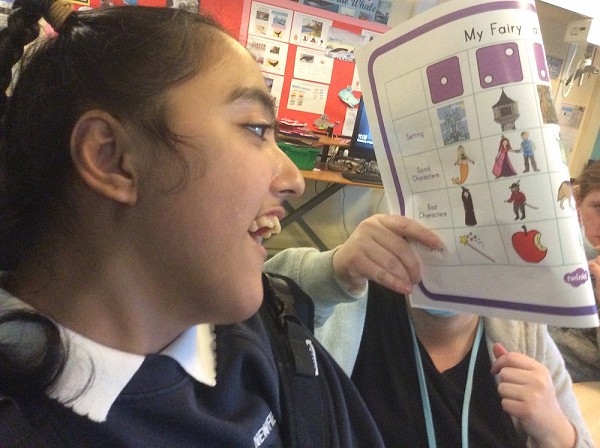
What does reading look like at Newfield?
The teaching of reading for Explorers (EYFS and KS1)
- Regular Twinkl phonics sessions. Initially phase 1 and moving through the scheme in line with pupil progress. Pupils needing additional support to be identified and interventions put in place by class teams.
- Sharing high quality stories and rhymes
- The children take a reading book home to share with the family and enjoy with adult support.
- Reading continuous provision in class
- Teachers and EHCAs monitor children’s reading progress through a combination of individual and group reading.
- Teachers and EHCAs to read with pupils regularly- at least once per week
- Regular trips to the school library
- Working towards the Early Learning Goals for Literacy
- Use of sensory story and Rhino Readers texts from school library to apply and practice phonics learning (decodable books to compliment the Twinkl phonics scheme, matched to the phonics level that pupils are working at)
- Reading skills and knowledge to be accessed in context of age appropriate themes and texts as identified on the theme map.
The teaching of reading in KS2
- Regular Twinkl phonics sessions -. Taught in phonics groups in line with individual pupil progress. Pupils needing additional support to be identified and interventions put in place by the class team with the support of the English lead.
- Sharing high quality stories and rhymes
- The children take a reading book home to share with the family and enjoy with adult support.
- Reading corner in class
- Teachers and EHCAs to continue to monitor children’s reading progress through a combination of individual and group reading.
- Regular trips to the school library
- Working towards the National Curriculum through the school’s reading framework
- Use of Rhino Readers texts from school library to apply and practice phonics learning (decodable books to compliment the Twinkl phonics scheme, matched to the phonics level that pupils are working at).
- Reading skills and knowledge to be accessed in context of age appropriate themes and texts as identified on the theme map.
- Opportunities to develop reading through play
The teaching of reading in KS3
- Regular Twinkl phonics sessions - Taught in phonics groups in line with individual pupil progress. Pupils needing additional support to be identified and interventions put in place by the class team with the support of the English lead.
- The children take a reading book home to share with the family and enjoy with adult support
- Teachers and EHCAs to continue to monitor children’s reading progress through a combination of individual and group reading.
- Opportunities for independent reading to encourage children to develop reading stamina and reading for pleasure.
- Regular trips to the school and community library, where appropriate.
- Working towards the National Curriculum through the school’s reading framework
- Use of HiLo Catch Up texts from school library to apply and practice phonics learning (fully decodable books aimed at older learners but matched to the Twinkl Phonics programme)
- Reading skills and knowledge to be accessed in context of age appropriate themes and texts as identified on the theme map
The teaching of reading in KS4
- Functional reading focus, phonics strategies continue to be referred to when reading and writing. Pupils needing additional support to be identified and interventions put in place by the class team with the support of the English lead.
- The children take a reading book home to share with the family and enjoy with adult support
- Teachers and EHCAs to continue to monitor children’s reading progress through a combination of individual and group reading.
- Opportunities for independent reading to encourage children to develop reading stamina and reading for pleasure.
- Regular trips to the school and community library
- Access to a range of high quality, age appropriate and differentiated texts available from the school library
- Reading skills and knowledge to be accessed in context of age appropriate themes and texts as identified on the theme map.
Text in italics above shows differences in teaching from previous key stage - indicating how teaching progresses across school.
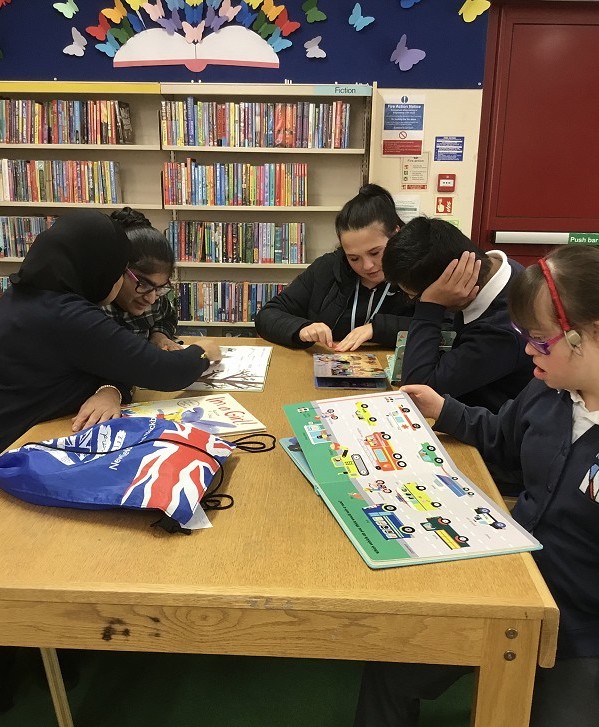
Developing a love of reading
To ensure learners leave us with a life-long love of books, reading for pleasure is prioritised across the school and books are central in our libraries, classrooms and teaching.
- Storytelling forms a key part in our teaching- classes will bring stories to life through sensory activities in props to ensure books are meaningful and engaging for our learners
- We have dedicated reading/ book corner in each classroom where diverse books are readily available (in the form of continuous provision in Explorer classes - EYFS & KS1)
- We have two school libraries which contain a range of high-quality texts based on recommended texts from Books for Topics. Our libraries are organised to have a primary and secondary section to ensure books pupils are accessing are age appropriate and engaging
- We celebrate World Book Day every year
- Books are sent home with children and updated regularly, along with access to eBook access, to promote reading both at school and home
- Classes do ‘drop everything and read’ each day, where a story is shared for pleasure, often at a level that pupils are able to read for themselves
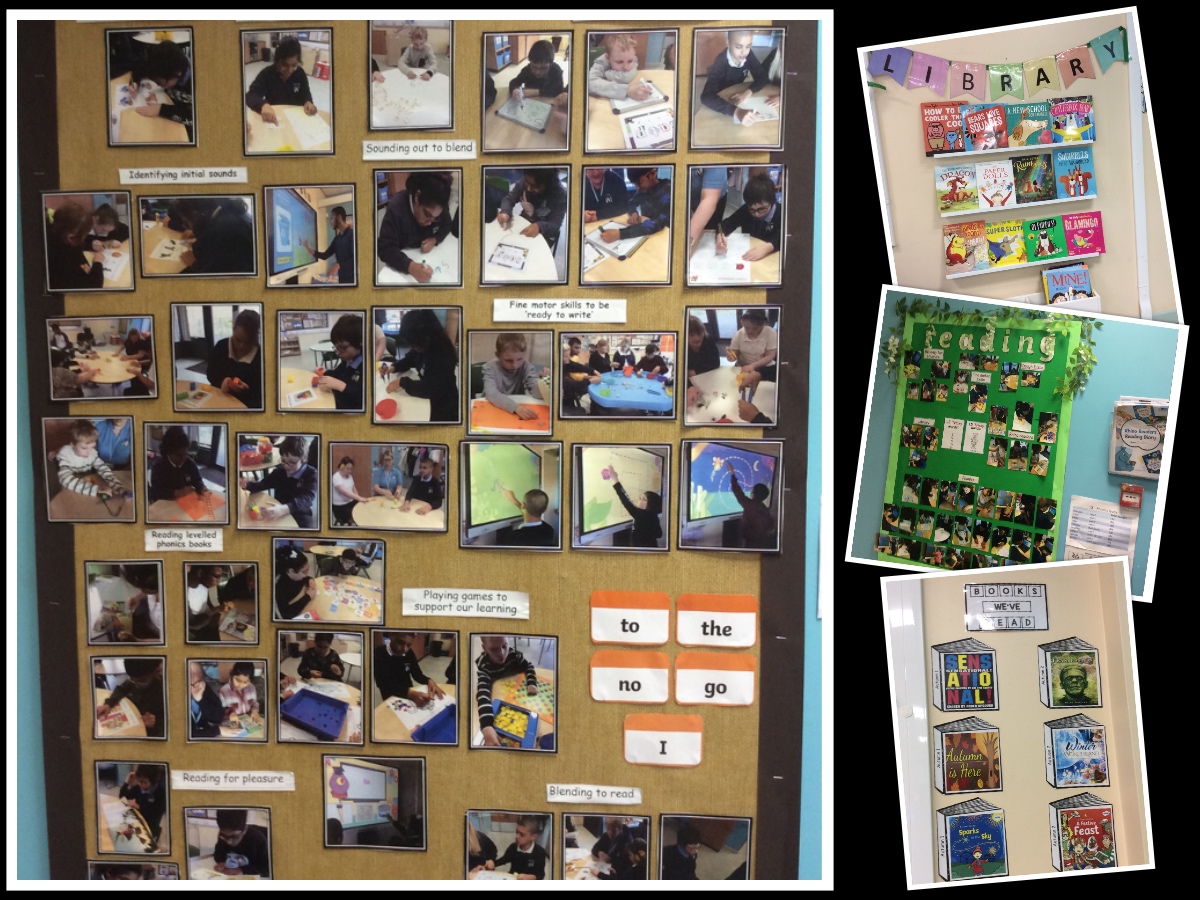
Teaching of English
click here to view or downloadPhysical Education & Development
All children and young people who attend Newfield School take part in a wide range of physical education and development sessions, depending on their needs, abilities, skills and age.
Our children and young people have a vast range of physical development needs, please see below an overview of how these are addressed and progress assessed.
More detailed information is available within the specific pathways sections of the curriculum area.
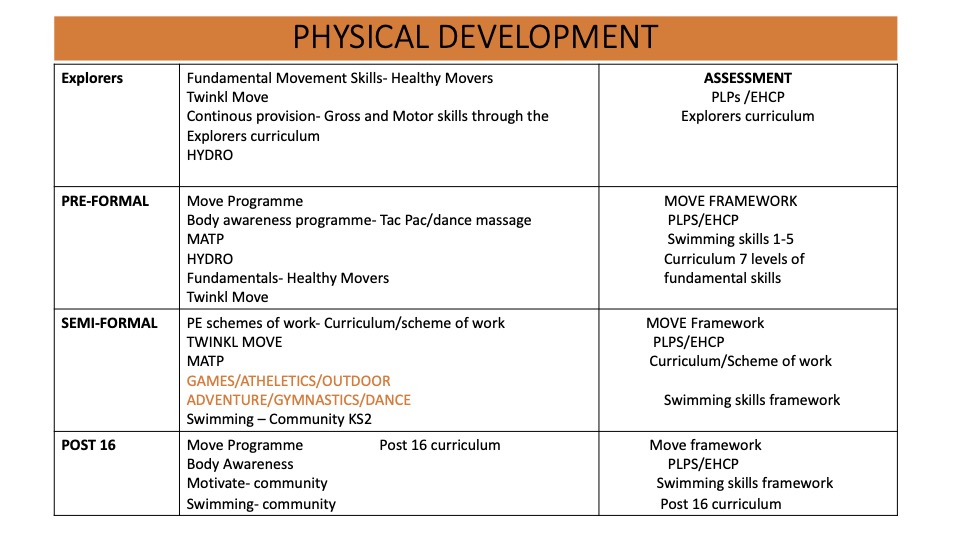
Social, Moral, Spiritual and Cultural
We are committed to providing activities which actively support the development of the cultural, social and mental well-being of all our pupils as a Rights Respecting School and this encompasses all of what we do, underpinning the intent of our curriculum and permeating the learning experiences offered to each individual.
We have a termly calendar of events to enrich our curriculum which promotes children’s participation in and understanding of cultural capital.
Religious Education
All children who attend Newfield School take part in discrete Religious Education lessons, which enable them to learn about world religions, spirituality and morality.
We adapt the BwD Agreed Syllabus for RE 2017 2022 to meet our learners needs.
Parents/Carers have the right to withdraw their children from Religious Education lessons and should contact school if they wish to do so.
Relationships Heath and Sex Education
Newfield School delivers relationships and health education for all pupils with the addition of sex education from key stage 3 in a manner appropriate to their age and development with emphasis is placed upon relationships and relationship building.
It is delivered as part of our PSED curriculum through both discrete and integrated modules that are part of the ethos of the school. Individual pupils may receive specific information at the request of the parents and in order to assist a pupil in understanding a particular issue or behaviour.
Individual or small group ‘Body Awareness’ sessions may also be facilitated by the school counsellor working alongside our nursing team who have had specialist training in working with children with SEN on sex and relationship issues.
Parents will be kept fully informed and invited to come and discuss any concerns before any sessions take place. There is a great deal of emphasis on protecting the child from harm and helping the child to keep themselves safe.
Parents can withdraw their child from taking part in Sex Education by informing the Head Teacher in writing. Students cannot be withdrawn from any part of RSHE which falls within Statutory National Curriculum Science.
More information is available within our Relationships Health and Sex Education Policy.
Arts Education and Provision
We believe that the arts provide an opportunity for all pupils to express and explore their emotions and feelings through providing vivid images/sounds aimed at promoting the development of expression.
Newfield is proud have become a nationally accredited Arts Award Centre in January 2015 - see Arts Award information.
There is also a dance element to the PE curriculum that also introduces the pupils to a variety of moods and themes for expression.
Newfield has an active school choir, which sings and signs and takes part in a wide variety of local choral events each year. and we also put on productions and concerts for the wider Newfield Family to enjoy, to celebrate our children’s talents.
Careers Education
We are committed to supporting our pupils to learn about the work of work. Pupils take part in a wide range of acitivites linked to the 8 Gatsby Benccmarks throughout their time at Newfield.
All students have opportunities to engage in work experience which is adapted to suit their interests and needs and is organised by school. Additionally, where appropriate in post 16, bespoke work placements are available in a range of local businesses including Tesco, Asda, The Range, Pets at Home.
For more infomration about Careers at Newfield, please visit our Careers Advice section in Preparing for Adulthood.
We have a Careers Policy which clearly outlines how we appraoch preparing our young people for adulthood via our careers programme.
We use the Compass Careers Benchmark tool to support us to ensure we address the 8 Gatsby Benchmarks.
